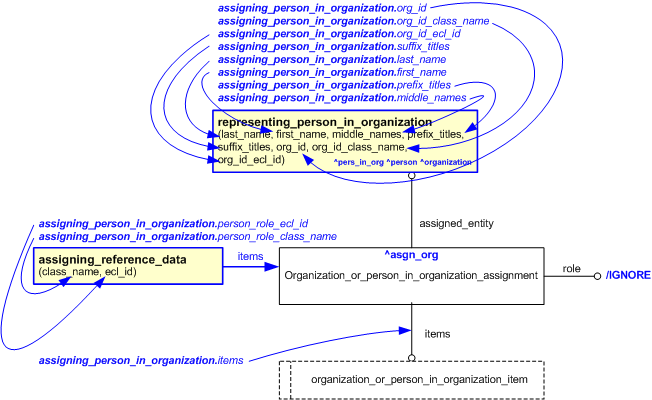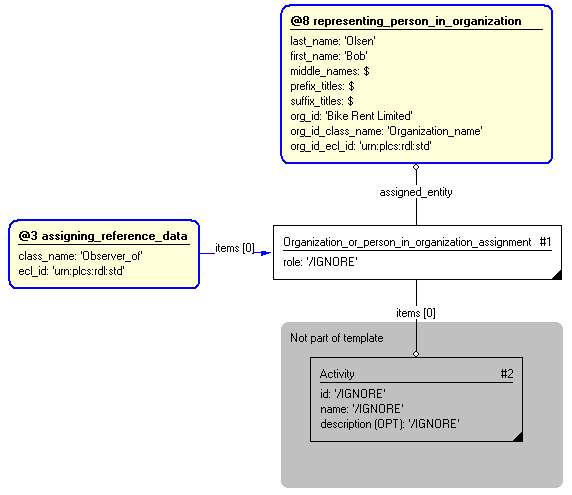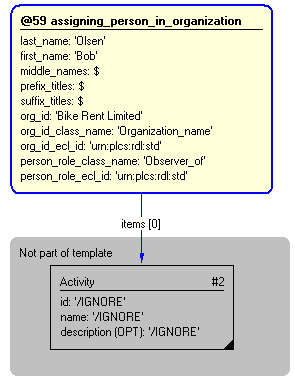| Template:— assigning_person_in_organization (asg_pers_org) |
Date: 2008/02/26 15:50:09
Revision: 1.18
|
This section specifies the template assigning_person_in_organization.
NOTE
An explanation of a template and the associated instantiation path is
provided in the
Template overview
section.
This template describes how to assign a person in the context of an organization to
something.
The EXPRESS-G diagram in
Figure
1
shows the templates and EXPRESS entities that are required
to represent the template
"assigning_person_in_organization".
The text highlighted in blue shows the template parameters.
Figure 1 — An EXPRESS-G representation of the Information model for
assigning_person_in_organization
The graphic for the template to be used in other EXPRESS-G diagrams
is shown in Figure
2
below.
Figure 2 — The graphical representation of assigning_person_in_organization template
The following input parameters are defined for this template:
the last name (surname) of the person doing the approval
The first element of the Person's list of forenames. This parameter is
optional.
The Person's other forenames.
The text that specifies the Person's social or professional standing and appear
before his or her names. This parameter is optional.
The text that specifies the Person's social or professional standing and appear
after his or her names. This parameter is optional.
The identifier or name of the organization.
The name of the class used to classify the identification (
Identification_assignment) of the organization. This provides the role or reason for the identification. For
example CAGE code.
The following classes and their sub-classes can be used:
The identifier of the
External_class_library storing the
definition of the class referenced by the parameter @org_id_class_name class.
The name of the class being used to classify the person assignment (
) This provides
the role for the assignment.
The following classes and their sub-classes can be used:
The identifier of the
External_class_library storing the
definition of the class referenced by the parameter @person_role_class_name class.
The items to which the person is assigned
The following reference parameters are defined for this template:
%^target = $assigning_person_in_organization.asgn_org%
Allow the
Person_in_organization
entity instantiated in this path to be referenced when this template is used.
%^target = $assigning_person_in_organization.pers_in_org%
Allow the
Person
entity instantiated in this path to be referenced when this template is used.
Note: The
Person
entity can be referenced in a template path by:
%^target = $assigning_person_in_organization.person%
where
target
is the parameter to which the
Person
is bound.
Allow the
Organization
entity instantiated in this path to be referenced when this template is used.
Note: The
Organization
entity can be referenced in a template path by:
%^target = $assigning_person_in_organization.organization%
where
target
is the parameter to which the
Organization
is bound.
The instantiation path shown below specifies the entities that are to be
instantiated by the template.
-- Instantiate Organization_or_person_in_organization_assignment entity Organization_or_person_in_organization_assignment-- Bind the Organization_or_person_in_organization_assignment -- to the parameter ^asgn_org. The parameter is a reference parameter -- so the Organization_or_person_in_organization_assignment -- entity can be referred to when this template is used. %^asgn_org =
Organization_or_person_in_organization_assignment%
-- Set the Organization_or_person_in_organization_assignment attribute role to be ignored Organization_or_person_in_organization_assignment.role = '/IGNORE'
-- Assign the Organization_or_person_in_organization_assignment -- to the instances passed into the template through the @items -- input parameter (e.g. an Activity_actual) Organization_or_person_in_organization_assignment.items ->
@items-- Assign reference data to Organization_or_person_in_organization_assignment /
assigning_reference_data(
items=^asgn_org,
class_name=@person_role_class_name,
ecl_id=@person_role_ecl_id)/
-- Instantiate representing_person_in_organization /
representing_person_in_organization(
last_name=@last_name,
first_name=@first_name,
middle_names=@middle_names,
prefix_titles=@prefix_titles,
suffix_titles=@suffix_titles,
org_id=@org_id,
org_id_class_name=@org_id_class_name,
org_id_class_name=@org_id_class_name,
org_id_ecl_id=@org_id_ecl_id)/
%^pers_in_org = $representing_person_in_organization.pers_in_org%
%^person = $representing_person_in_organization.pers%
%^organization = $representing_person_in_organization.org%
-- Assign the Organization_or_person_in_organization_assignment -- to the representing_person_in_organization template Organization_or_person_in_organization_assignment.assigned_entity ->
^pers_in_org
The following entities are instantiated with attributes as specified:
The instance diagram in Figure
3
shows an example of the EXPRESS entities and templates that are instantiated by the template:
(an illustration of the consolidated assigning_person_organization template is shown in
Figure
4 below.)
Figure 3 — Entities instantiated by assigning_person_in_organization template
The instance diagram in
Figure
4
shows the graphic symbol for the template that is to be
used in other instance diagrams. The example template is:
Figure 4 — Instantiation of assigning_person_in_organization template
Characterizations
No common characterizations of the template
assigning_person_in_organization
have been identified. However, the ISO 10303-239 EXPRESS model
may enable other assignments to the entities instantiated by the template.




